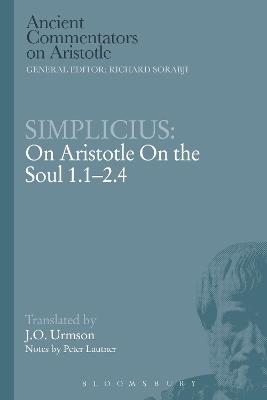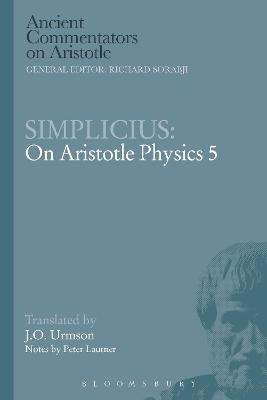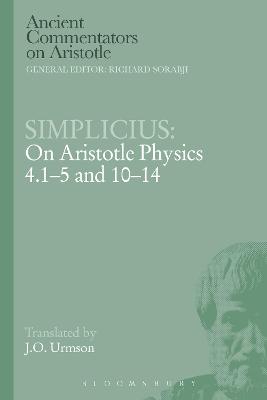Ancient Commentators on Aristotle
3 total works
The commentary attributed to Simplicius on Aristotle's On the Soul appears in this series in three volumes, of which this is the first. The translation provides the first opportunity for a wider readership to assess the disputed question of authorship. Is the work by Simplicius, or by his colleague Priscian, or by another commentator? In the second volume, Priscian's Paraphrase of Theophrastus on Sense Perception, which covers the same subject, will also be translated for comparison.
Whatever its authorship, the commentary is a major source for late Neoplatonist theories of thought and sense perception and provides considerable insight into this important area of Aristotle's thought. In this first volume, the Neoplatonist commentator covers the first half of Aristotle's On the Soul, comprising Aristotle's survey of his predecessors and his own rival account of the nature of the soul.
Whatever its authorship, the commentary is a major source for late Neoplatonist theories of thought and sense perception and provides considerable insight into this important area of Aristotle's thought. In this first volume, the Neoplatonist commentator covers the first half of Aristotle's On the Soul, comprising Aristotle's survey of his predecessors and his own rival account of the nature of the soul.
Simplicius, the greatest surviving ancient authority on Aristotle's Physics , lived in the sixth century A. D. He produced detailed commentaries on several of Aristotle's works. Those on the Physics, which alone come to over 1,300 pages in the original Greek, preserve a centuries-old tradition of ancient scholarship on Aristotle.
In Physics Book 5 Aristotle lays down some of the principles of his dynamics and theory of change. What does not count as change: change of relation? The flux of time? There is no change of change, yet acceleration is recognised. Aristotle defines 'continuous', 'contact' and 'next', and uses these definitions in discussing when we can claim that the same change or event is still going on.
This volume is complemented by David Konstan's translation of Simplicius' commentary on Physics Book 6, which has already appeared in this series. It is Book 6 that gives spatial application to the terms defined in Book 5, and uses them to mount a celebrated attack on atomism. Simplicius' commentaries enrich our understanding of the Physics and of its interpretation in the ancient world.
In Physics Book 5 Aristotle lays down some of the principles of his dynamics and theory of change. What does not count as change: change of relation? The flux of time? There is no change of change, yet acceleration is recognised. Aristotle defines 'continuous', 'contact' and 'next', and uses these definitions in discussing when we can claim that the same change or event is still going on.
This volume is complemented by David Konstan's translation of Simplicius' commentary on Physics Book 6, which has already appeared in this series. It is Book 6 that gives spatial application to the terms defined in Book 5, and uses them to mount a celebrated attack on atomism. Simplicius' commentaries enrich our understanding of the Physics and of its interpretation in the ancient world.
This companion to J. O. Urmson's translation in the same series of Simplicius' Corollaries on Place and Time contains Simplicius' commentary on the chapters on place and time in Aristotle's Physics book 4. It is a rich source for the preceding 800 years' discussion of Aristotle's views. Simplicius records attacks on Aristotle's claim that time requires change, or consciousness. He reports a rebuttal of the Pythagorean theory that history will repeat itself exactly. He evaluates Aristotle's treatment of Zeno's paradox concerning place. Throughout he elucidates the structure and meaning of Aristotle's argument, and all the more clearly for having separated off his own views into the Corollaries.


